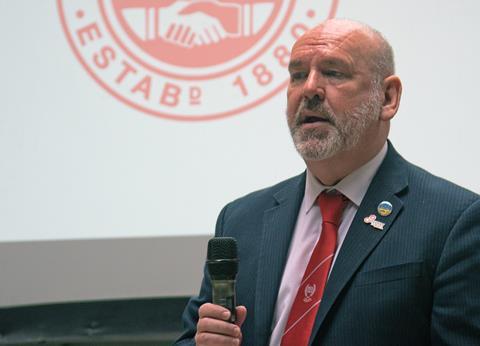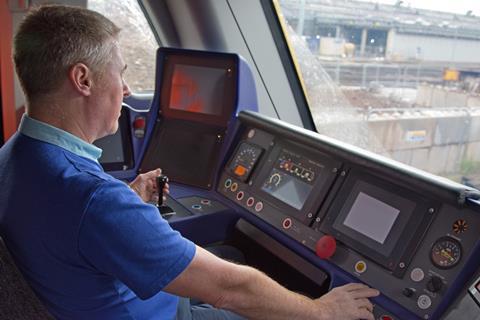
UK: ASLEF General Secretary Mick Whelan has told Rail Business UK that pay talks are proving difficult, with the trade unions legally obliged to negotiate with the train operating companies which employ them, while those employers are tightly controlled by the Department for Transport under the terms of their National Rail Contracts.
‘Our real problem is that we do not work for DfT or for the Treasury; we work for those owning companies and the government has no role in setting our wages and conditions’, he said. ‘But we’re going into rooms to do a deal and being told “the DfT won’t let us do this or that” — now that’s an immediate trade dispute because they’re breaking the agreements on free collective bargaining.
‘We’re going to end up with an industry where we want passengers to return, for the fare box to come back, and yet whilst they want us to do our part no-one is going to give us a pay rise. We have a free collective bargaining agreement with the TOCs and if they don’t honour this we’ll take them to the High Court.’
Happy to talk to anyone
Following the announcement of ballot results which saw ASLEF members at eight operators vote for industrial action, Whelan explained in a statement that ‘we are happy to talk to anyone to do a deal and make sure Britain’s railways aren’t disrupted. The government is restricting what the operators can offer, but then refusing to get involved in negotiation. They seem to have no interest in finding a resolution.
‘We don’t want to inconvenience passengers — our friends and families use public transport, too — and we don’t want to lose money by going on strike but we’ve been forced into this position by the companies driven by the government.’

Given the current uncertainty in government, with many posts filled on a temporary basis and outgoing Prime Minister Boris Johnson having stated that no new policy decisions will be taken until his successor is in place, there remains some uncertainty over whether the Treasury could allow DfT to advise TOCs that a pay offer matching the one accepted in Scotland could be put forward.
If this is the case, then the union may conclude that strike action is not the best immediate option. However, many TOC managers suggest that action short of a strike, with a refusal to work overtime brought in, would still prove to be ‘massively disrupting’ and so this could form the first step in any action the union might take.
Talking to Rail Business UK ahead of the ballot result, Whelan said ‘we have no choice but to reflect the views of our members, and as well as the lack of a pay increase so far the calls from the members are driven by inflationary pressure.
‘It’s the government that’s in charge of the economy not us. When inflation has passed 8% it doesn’t matter whether you are on £24k or £54k, people take a hit and they want that addressed. We’re asking for something that reflects what’s happened with inflation.’
Noting that the owning groups continue to be paid by DfT to keep services running, Whelan commented ‘it is not unreasonable to ask your employer to make sure you’re not worse off for three years in a row. Especially as the train companies are doing very nicely, thank you, out of Britain’s railways — with handsome profits, dividends for shareholders, and big salaries for managers — and train drivers don’t want to work longer for less.’
Seven days a week railway
Reflecting on calls from DfT for unions to accept that ‘modernisation’ has to take place, such as an agreement for Sundays to be part of the working week rather than covered by overtime and rest day working agreements, Whelan told Rail Business UK ‘we are a seven day a week, 24 h a day railway. I fully support that and don’t have a problem with it.’
He said the situation where Sundays are part of the working week for some people and not others had arisen because ‘all of the big inter-city operators were able to buy out the Sundays, but the regional railways couldn’t afford to do it and the bosses left it as voluntary.
‘Now people have had 25 years of voluntary working on a Sunday, why would they give it up? The quality time off that they want to buy off us comes at a premium now, and the idea that people will do it for less or have it forced upon them is anathema to them.
‘I’ve put it out on social media that the minister and the industry can have whatever they can afford, but there seems to be this overarching view that we should give it up for nothing. We only have one thing to sell and that’s our labour.’
He said ‘over the last 23 years, any time they wanted to introduce a new train or do a major project we’ve given flexibility and they put the money for that flexibility into our wages. The idea that we’ve been given something for nothing isn’t true. We’ve always given productivity or something for it, and the idea that they can somehow claim it back and go back to an industry like British Rail where people worked 28 days on the trot, 12 h a day, just to survive isn’t going to happen on my watch.’
| ASLEF industrial action ballot results |
|---|
|
ASLEF members at have voted overwhelmingly for strike action or action short of a strike in a dispute over pay at Arriva Rail London (London Overground), Chiltern Railways, Great Western Railway, LNER, Northern, Southeastern, TransPennine Express and West Midlands Trains.
The ballot results were announced on July 11, on the same day the union announced that its members had accepted an improved offer from ScotRail which includes a 5% increase in basic pay as well as an excess revenue share premium and additional improvements to other terms and conditions.
Ballots close on Wednesday July 27 at Avanti West Coast, CrossCountry and Direct Rail Services.
Pay deals have been successfully concluded with DB Cargo, Eurostar, Freightliner Heavy Haul, Freightliner Intermodal, GB Railfreight, Merseyrail, MTR Elizabeth Line and Pre Metro Operations.
Multi-year deals are already in place with other companies. |



